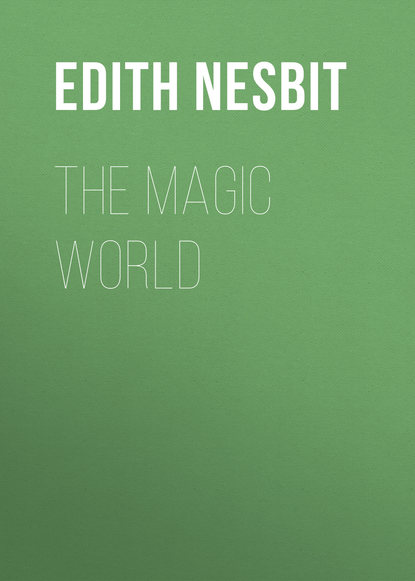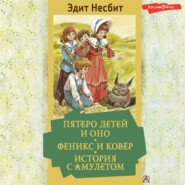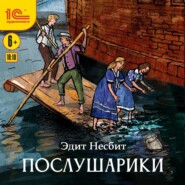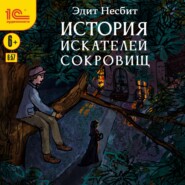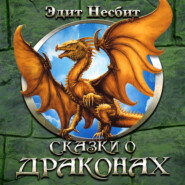По всем вопросам обращайтесь на: info@litportal.ru
(©) 2003-2024.
✖
The Magic World
Настройки чтения
Размер шрифта
Высота строк
Поля
Only Maurice and Lord Hugh know the truth – Maurice has never told it to any one except me, and Lord Hugh is a very reserved cat. He never at any time had that free flow of mew which distinguished and endangered the cat-hood of Maurice.
II
THE MIXED MINE
The ship was first sighted off Dungeness. She was labouring heavily. Her paint was peculiar and her rig outlandish. She looked like a golden ship out of a painted picture.
‘Blessed if I ever see such a rig – nor such lines neither,’ old Hawkhurst said.
It was a late afternoon, wild and grey. Slate-coloured clouds drove across the sky like flocks of hurried camels. The waves were purple and blue, and in the west a streak of unnatural-looking green light was all that stood for the splendours of sunset.
‘She do be a rum ’un,’ said young Benenden, who had strolled along the beach with the glasses the gentleman gave him for saving the little boy from drowning. ‘Don’t know as I ever see another just like her.’
‘I’d give half a dollar to any chap as can tell me where she hails from – and what port it is where they has ships o’ that cut,’ said middle-aged Haversham to the group that had now gathered.
‘George!’ exclaimed young Benenden from under his field-glasses, ‘she’s going.’ And she went. Her bow went down suddenly and she stood stern up in the water – like a duck after rain. Then quite slowly, with no unseemly hurry, but with no moment’s change of what seemed to be her fixed purpose, the ship sank and the grey rolling waves wiped out the place where she had been.
Now I hope you will not expect me to tell you anything more about this ship – because there is nothing more to tell. What country she came from, what port she was bound for, what cargo she carried, and what kind of tongue her crew spoke – all these things are dead secrets. And a dead secret is a secret that nobody knows. No other secrets are dead secrets. Even I do not know this one, or I would tell you at once. For I, at least, have no secrets from you.
When ships go down off Dungeness, things from them have a way of being washed up on the sands of that bay which curves from Dungeness to Folkestone, where the sea has bitten a piece out of the land – just such a half-moon-shaped piece as you bite out of a slice of bread-and-butter. Bits of wood tangled with ropes – broken furniture – ships’ biscuits in barrels and kegs that have held brandy – seamen’s chests – and sometimes sadder things that we will not talk about just now.
Now, if you live by the sea and are grown-up you know that if you find anything on the seashore (I don’t mean starfish or razor-shells or jellyfish and sea-mice, but anything out of a ship that you would really like to keep) your duty is to take it up to the coast-guard and say, ‘Please, I’ve found this.’ Then the coast-guard will send it to the proper authority, and one of these days you’ll get a reward of one-third of the value of whatever it was that you picked up. But two-thirds of the value of anything, or even three-thirds of its value, is not at all the same thing as the thing itself – if it happened to be the kind of thing you want. But if you are not grown-up and do not live by the sea, but in a nice little villa in a nice little suburb, where all the furniture is new and the servants wear white aprons and white caps with long strings in the afternoon, then you won’t know anything about your duty, and if you find anything by the sea you’ll think that findings are keepings.
Edward was not grown-up – and he kept everything he found, including sea-mice, till the landlady of the lodgings where his aunt was threw his collection into the pig-pail.
Being a quiet and persevering little boy he did not cry or complain, but having meekly followed his treasures to their long home – the pig was six feet from nose to tail, and ate the dead sea-mouse as easily and happily as your father eats an oyster – he started out to make a new collection.
And the first thing he found was an oyster-shell that was pink and green and blue inside, and the second was an old boot – very old indeed – and the third was it.
It was a square case of old leather embossed with odd little figures of men and animals and words that Edward could not read. It was oblong and had no key, but a sort of leather hasp, and was curiously knotted with string – rather like a boot-lace. And Edward opened it. There were several things inside: queer-looking instruments, some rather like those in the little box of mathematical instruments that he had had as a prize at school, and some like nothing he had ever seen before. And in a deep groove of the russet soaked velvet lining lay a neat little brass telescope.
T-squares and set-squares and so forth are of little use on a sandy shore. But you can always look through a telescope.
Edward picked it out and put it to his eye, and tried to see through it a little tug that was sturdily puffing up Channel. He failed to find the tug, and found himself gazing at a little cloud on the horizon. As he looked it grew larger and darker, and presently a spot of rain fell on his nose. He rubbed it off – on his jersey sleeve, I am sorry to say, and not on his handkerchief. Then he looked through the glass again; but he found he needed both hands to keep it steady, so he set down the box with the other instruments on the sand at his feet and put the glass to his eye again.
He never saw the box again. For in his unpractised efforts to cover the tug with his glass he found himself looking at the shore instead of at the sea, and the shore looked so odd that he could not make up his mind to stop looking at it.
He had thought it was a sandy shore, but almost at once he saw that it was not sand but fine shingle, and the discovery of this mistake surprised him so much that he kept on looking at the shingle through the little telescope, which showed it quite plainly. And as he looked the shingle grew coarser; it was stones now – quite decent-sized stones, large stones, enormous stones.
Something hard pressed against his foot, and he lowered the glass.
He was surrounded by big stones, and they all seemed to be moving; some were tumbling off others that lay in heaps below them, and others were rolling away from the beach in every direction. And the place where he had put down the box was covered with great stones which he could not move.
Edward was very much upset. He had never been accustomed to great stones that moved about when no one was touching them, and he looked round for some one to ask how it had happened.
The only person in sight was another boy in a blue jersey with red letters on its chest.
‘Hi!’ said Edward, and the boy also said ‘Hi!’
‘Come along here,’ said Edward, ‘and I’ll show you something.’
‘Right-o!’ the boy remarked, and came.
The boy was staying at the camp where the white tents were below the Grand Redoubt. His home was quite unlike Edward’s, though he also lived with his aunt. The boy’s home was very dirty and very small, and nothing in it was ever in its right place. There was no furniture to speak of. The servants did not wear white caps with long streamers, because there were no servants. His uncle was a dock-labourer and his aunt went out washing. But he had felt just the same pleasure in being shown things that Edward or you or I might have felt, and he went climbing over the big stones to where Edward stood waiting for him in a sort of pit among the stones with the little telescope in his hand.
‘I say,’ said Edward, ‘did you see any one move these stones?’
‘I ain’t only just come up on to the sea-wall,’ said the boy, who was called Gustus.
‘They all came round me,’ said Edward, rather pale. ‘I didn’t see any one shoving them.’
‘Who’re you a-kiddin’ of?’ the boy inquired.
‘But I did,’ said Edward, ‘honour bright I did. I was just taking a squint through this little telescope I’ve found – and they came rolling up to me.’
‘Let’s see what you found,’ said Gustus, and Edward gave him the glass. He directed it with inexpert fingers to the sea-wall, so little trodden that on it the grass grows, and the sea-pinks, and even convolvulus and mock-strawberry.
‘Oh, look!’ cried Edward, very loud. ‘Look at the grass!’
Gustus let the glass fall to long arm’s length and said ‘Krikey!’
The grass and flowers on the sea-wall had grown a foot and a half – quite tropical they looked.
‘Well?’ said Edward.
‘What’s the matter wiv everyfink?’ said Gustus. ‘We must both be a bit balmy, seems ter me.’
‘What’s balmy?’ asked Edward.
‘Off your chump – looney – like what you and me is,’ said Gustus. ‘First I sees things, then I sees you.’
‘It was only fancy, I expect,’ said Edward. ‘I expect the grass on the sea-wall was always like that, really.’
‘Let’s have a look through your spy-glass at that little barge,’ said Gustus, still holding the glass. ‘Come on outer these ’ere paving-stones.’
‘There was a box,’ said Edward, ‘a box I found with lots of jolly things in it. I laid it down somewhere – and – ’
‘Ain’t that it over there?’ Gustus asked, and levelled the glass at a dark object a hundred yards away. ‘No; it’s only an old boot. I say, this is a fine spy-glass. It does make things come big.’
‘That’s not it. I’m certain I put it down somewhere just here. Oh, don’t!’
He snatched the glass from Gustus.
‘Look!’ he said, ‘look!’ and pointed.
A hundred yards away stood a boot about as big as the bath you see Marat in at Madame Tussaud’s.
‘S’welp me,’ said Gustus, ‘we’re asleep, both of us, and a-dreaming as things grow while we look at them.’





